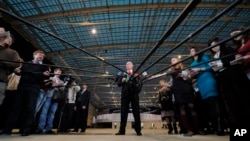MOSCOW —
Russians are celebrating as a diplomatic victory President Barack Obama’s decision to hold off on military strikes against Syria in return for the destruction of Syria’s chemical weapons. After two years as deal breakers in Syria’s civil war, Russians suddenly see themselves as peacemakers.
“Russia just used a very good opportunity to step in and take initiative to a peaceful solution of a very important issue,” said Fyodor Lukyanov, editor of Russia in Global Affairs journal.
After the humiliations of the post-Soviet era, Russians relish once again being center stage, this time as peacemakers.
It was in Moscow where Syria’s Foreign Minister Walid al-Moualem broke a decades-old taboo and admitted Tuesday that his government possesses a chemical weapons arsenal. Looking grim for the cameras, he promised to put this arsenal under international controls and to sign the international treaty banning chemical weapons.
International support
Hinting at future obstacles for Moscow, however, Damascus state-controlled media downplayed the Syrian minister’s comments, forcing Russian diplomats to work overtime to build world political support.
Story continues below photo gallery:
They have already collected backing from China and Iran, and gone out of their way to credit the United States with co-authorship of the disarmament proposal.
“For all in the United States it might be a good solution, because Obama can say — and everybody, Congress, can say — that's because of us,” said Lukyanov. “'We pressed, made big pressure on Assad. We threatened him with war and then he gave up. For the Russian side, this is a very good opportunity to show that the Russian position did make sense."
But first Syria’s leaders may test Russian President Vladimir Putin’s new role as peacemaker.
Daunting challenges
According to Alexander Golts, a military expert and deputy editor of the online newspaper Yezhednevny Zhurnal, the Russian president has had bad experiences with leaders of North Korea and Iran.
“The basic question about the Russian initiative is, can you trust the words of Syrian officials, or not?” Golts asked. “Unfortunately, Russian leader Vladimir Putin had a rather bad story with two leaders of specific countries — [late North Korean leader] Kim Jong Il and [former Iranian President] Mahmoud Ahmadinejad. Mr. Putin met each of them, received the promises he wanted, and the next day both of these men said they were misunderstood and joking.”
And then there are daunting technical challenges: Over the last 15 years, Russia has gained weapons disposal experience, gradually destroying its own chemical arsenal.
Syria is believed to have 1,000 tons of highly toxic agents, spread over 60 locations. But all this is in the middle of a raging civil war that has claimed 100,000 lives and has displaced one-third of the population, which means the best disposal strategy might be mobile incinerators protected by international peacekeeping soldiers.
“When Russia stood before the problem of dismantling its own chemical weapons," said Golts, "it preferred not to move these agents all over the country, but to build plants and special facilities for destroying these weapons directly in places where these weapons were stored.”
By next week Russia is to have assembled a naval task force of 10 warships off the coast of Syria, whereas just last week many people assumed the fleet was steaming toward Syria in a gesture of gunboat diplomacy, aimed at the U.S. Navy.
Now, conceivably, the cannons could point the other way, encouraging Syria to keep its promise to destroy its chemical arsenal.
“Russia just used a very good opportunity to step in and take initiative to a peaceful solution of a very important issue,” said Fyodor Lukyanov, editor of Russia in Global Affairs journal.
After the humiliations of the post-Soviet era, Russians relish once again being center stage, this time as peacemakers.
It was in Moscow where Syria’s Foreign Minister Walid al-Moualem broke a decades-old taboo and admitted Tuesday that his government possesses a chemical weapons arsenal. Looking grim for the cameras, he promised to put this arsenal under international controls and to sign the international treaty banning chemical weapons.
International support
Hinting at future obstacles for Moscow, however, Damascus state-controlled media downplayed the Syrian minister’s comments, forcing Russian diplomats to work overtime to build world political support.
Story continues below photo gallery:
They have already collected backing from China and Iran, and gone out of their way to credit the United States with co-authorship of the disarmament proposal.
“For all in the United States it might be a good solution, because Obama can say — and everybody, Congress, can say — that's because of us,” said Lukyanov. “'We pressed, made big pressure on Assad. We threatened him with war and then he gave up. For the Russian side, this is a very good opportunity to show that the Russian position did make sense."
But first Syria’s leaders may test Russian President Vladimir Putin’s new role as peacemaker.
Daunting challenges
According to Alexander Golts, a military expert and deputy editor of the online newspaper Yezhednevny Zhurnal, the Russian president has had bad experiences with leaders of North Korea and Iran.
“The basic question about the Russian initiative is, can you trust the words of Syrian officials, or not?” Golts asked. “Unfortunately, Russian leader Vladimir Putin had a rather bad story with two leaders of specific countries — [late North Korean leader] Kim Jong Il and [former Iranian President] Mahmoud Ahmadinejad. Mr. Putin met each of them, received the promises he wanted, and the next day both of these men said they were misunderstood and joking.”
And then there are daunting technical challenges: Over the last 15 years, Russia has gained weapons disposal experience, gradually destroying its own chemical arsenal.
Syria is believed to have 1,000 tons of highly toxic agents, spread over 60 locations. But all this is in the middle of a raging civil war that has claimed 100,000 lives and has displaced one-third of the population, which means the best disposal strategy might be mobile incinerators protected by international peacekeeping soldiers.
“When Russia stood before the problem of dismantling its own chemical weapons," said Golts, "it preferred not to move these agents all over the country, but to build plants and special facilities for destroying these weapons directly in places where these weapons were stored.”
By next week Russia is to have assembled a naval task force of 10 warships off the coast of Syria, whereas just last week many people assumed the fleet was steaming toward Syria in a gesture of gunboat diplomacy, aimed at the U.S. Navy.
Now, conceivably, the cannons could point the other way, encouraging Syria to keep its promise to destroy its chemical arsenal.





